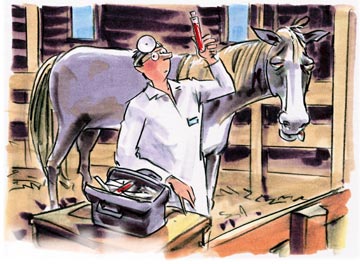|
 The horse's heart rate may be elevated--normal is about 30 beats per minute--to more than 45 or 50 beats per minute. The mucous membranes may appear very pale or white, and urine may be discolored or reddish. The horse's heart rate may be elevated--normal is about 30 beats per minute--to more than 45 or 50 beats per minute. The mucous membranes may appear very pale or white, and urine may be discolored or reddish.
Anemia resulting from direct blood loss is often the easiest to diagnose, but is still a challenge to treat. Generally there will be signs of shock (weak pulse, elevated heart rate, pale mucous membranes). Other signs may include profuse bleeding from the nose.
Anemia due to inadequate red blood cell production is the most common form of anemia in horses; however, it is the most challenging to identify. These horses may show low-grade exercise intolerance, poor appetite and lethargy.
Infections ranging from pneumonia to renal disease can, if prolonged, result in significant anemia.
Certain types of cancer may clinically manifest as anemia, as may several different viruses, such as Equine Infectious Anemia (EIA).
Less frequently, deficiencies of iron, copper, protein and B vitamins can impair the body's ability to manufacture red blood cells.
Anemia resulting from increased red blood cell destruction is often accompanied by fever and yellowish mucous membranes. In more severe cases, the horse's urine will be a dark-reddish brown.
This category of anemia has many causes, including red maple leaf toxicity. Parasites, certain types of neoplasia, drug toxicity (particularly that which involves anti-inflammatory drugs) and neonatal isoerythrolysis are other causes.
The diagnosis of equine anemia is based on clinical signs that indicate reduced oxygen transport to tissues and a reduced packed cell volume. The packed cell volume (PCV) measures the percentage of circulating red blood cells in the bloodstream.
Normally a horse has a PCV of about 40 percent (with some age and breed variations). A horse with a PCV of less than 30 percent is considered anemic, and efforts should be made to identify the source of the lack of red cells.
To complicate matters, a significant number--up to 30 percent of the total red blood cells--of red blood cells will be sequestered in the spleen of a resting horse, even a fit one.
Therefore, initial PCV evaluations on resting horses may be deceiving, because following a period of exercise or excitement, the PCV will be elevated to its normal range.
If the PCV drops below 15 percent, a blood transfusion may be necessary. This is often performed at a referral center where blood donors may be kept and cross-matching is performed.
While the diagnosis of anemia in horses is straightforward, involving a blood sample and centrifuge, the challenge is determining the primary cause.
If the anemia is due to acute blood loss, the source of the trauma or hemorrhage should be identified and controlled, and your veterinarian should be contacted immediately.
You should also contact your veterinarian if your horse shows less definitive symptoms, such as exercise intolerance and depression or decreased appetite.
Your vet will likely perform a complete physical examination and take blood samples.

|